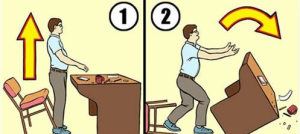These are the 5 big things that have certainly annoyed me about working in Japan vs working in the USA. I can’t say anything for other regions of the world, but from what I’ve heard, these 5 offenses are primarily perpetrated by Japanese companies.
1.) What janitorial staff? That’s YOU! Along with the office manager, IT squad, etc. For most JP companies, the thought of hiring a few extra hands to help keep the machine well oiled just doesn’t happen. You’d think the country known for hiring 3 clerks per register at department stores(one to wrap your item, 1 to take your money and finally one to hand you your change) would be overflowing with support staff. Ha ha ha…Nope! When your name is on the 掃除当番、 you’re expected to either come in early or clean through your meal breaks.
Now if I was properly paid to do these duties, I wouldn’t be pitching a fit over this, but alas, they’re cutting into my break time, aren’t paid and worst of all, the company expects you to shoehorn this crap into an already oppressive schedule. Producers don’t schedule enough time for workers to eat and sleep properly, what would make you think they properly account for all this cleaning? Japanese public schools force students to clean their campus; this makes sense to me, it teaches a life skill along with responsibility and all that. But for work? In the USA, wage gaps are significantly higher than in Japan; I wouldn’t be surprised if a janitor’s daily wage is close to 1 hour of a senior software engineer’s wage. In Japan, unless you hit director level, you’re probably going to make more money as a cleaner.
2.) The wretched pay scams. Japanmanship has covered the Great Bonus Scam(which I’ve had in a contract) but there’s another sinister type of contract I’ll call the Great Overtime Advance Scam. What this does is it keeps your base pay in the poverty zone and then inflates it to something you can live off of via advances in overtime pay.
The # of hours of additional overtime are straight from a contract I’ve held. Most game companies keep your base salary close to what McDonalds workers earn, then pad up the salary a bit by adding these up front overtime payments.
基準年俸 Annual Salary assuming 2080(40 hours/wk x 52 weeks)
加算年俸超過勤務等45時間分Additional 45 hours of overtime/month
加算年俸超過勤務等20時間分 Additional 20 hours of overtime/month
Assuming the 40 hour full time work week for 4 weeks, the company is paying for 225 hours/month. Or 56.25 hours per week. Hoo boy, life would be nicer if I only worked 56-57 hours a week…
Can’t you use the pay as a ceiling for overtime worked? I’ve heard of other people using that approach but I’m not sure how successful it is.
Will I get pay deducted if I don’t do that overtime? In my considered legal opinion, maybe. A friend of mine who was pulling hundred hour weeks fell ill and his doctor told him he could work but he wasn’t allowed to do overtime. His contract was similar to mine, he had overtime advance payments to pad his salary and when the company saw the doctor’s note, they only paid him his base salary for the whole year, even though he’d easily been pulling stupid levels of overtime for at least half the year.
Was that move illegal? I would hope so, but given the crack pot labor laws here, there could be a loop hole that allows it for all I know. Said friend quit immediately and found a job that was far better.
3.) Deadwood floats to the top. 正社員 are difficult to fire and this cuts both ways. It’s important to encourage risk taking as the more creative you are, inherently the greater the risk. It’s a lot more risky to make a hardcore 4 player action RPG with a brilliant hand painted visual style in 2D than it is a lame-o social card game.
Sadly, the low pay, the mismanagement and all that allow for 2 types of people to float to the top: miracle workers and the termite infested bloated dry rotten dead wood.
4.) Working FOR not WITH directors. Games you’re a fan of are like sausages, you’ll reel in horror when you find out how they’re made. The horror factor increases by the hundred fold when you take a low paying job on the floor of the sausage factory itself. Having worked with some fairly popular creators in Japan, it became obvious pretty quickly that you’re simply their arms and legs.
There’s a significant difference between demanding high standards and expecting the team to be ESPers that move exactly how the director wants them to.
5.) The hours. Horrid for productivity, horrid for health, and yet they don’t change very quickly. A lot of the project managers/schedule makers in the Japanese game industry are still using old methods from the Super Famicom days. Accounting for Murphy Time-time needed to recover from when Murphy’s Law kicks in-is almost unheard of. Top managers who should be serving as Development Abstraction Layers get weak in the knees during negotiations with clients and throw up white flags before shots are even fired.
Fortunately, the number of companies that are reducing hours are growing, albeit slowly. Even more fortunately, one of the companies doing that is Nintendo subsidiary Monolith Soft. They are an industry leader in Japan and hopefully monkey see monkey do will help perpetuate better work balance. There’s some hope for this, though change can’t come fast enough. Monolith posted a big recruitment article on CGWorld Japan touting that they know how hard it is to keep hours down in creative industries but with pipeline improvements, it’s possible.
Next! 5 reasons I’m staying in this country. I’m sure you all think I’m completely insane for staying in a place that pulls all these shenanigans…
